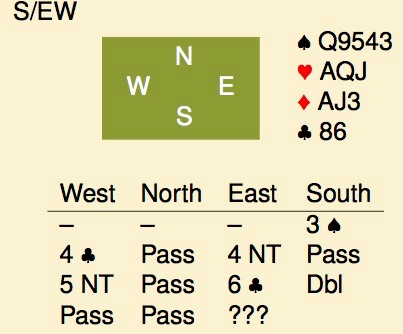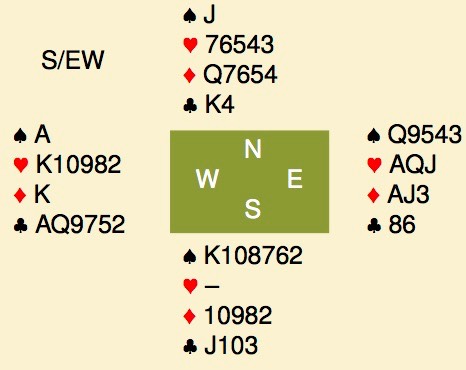Over the last 2 weeks, the Olympiad was played in Wroclaw, Poland. I spent a lot of time watching the action on BBO and had a great time doing so. I’m not going to show many hands, as most of the interesting hands were well written up in the daily bulletins. The only flaw was that there wasn’t much reporting on the mixed teams, and 4 bridgeplaying friends led the field from start to finish. Of course, the cherry on the cake were the two wins by the Dutch teams in the Open and Mixed categories. Also unique is the record set by Bob Hamman, He won his first Olympic medal in 1964 (silver), 52 years later he won gold. i’m not sure but this must be a record in any sport.
What spoiled the event for me, as an interested spectator, was the large number of incidents at the event. It all started a couple of days before the opening ceremony, when the Italian pair Enza Rossano and Antonio Vivaldi saw their invitation to the event withdrawn by the WBF credentials committee. No reasons were given, and the WBF-CC doesn’t have to do this, but as the WBF-CC has been established to prevent alleged cheaters from entering. What strikes me as odd in this case is the time of the event. The pair in question did represent Italy many times in the 1990’s and 2000’s, but wasn’t very active recently. If there were suspicions, the WBF had some 6 years to investigate. That didn’t happen, which is quite strange for an organization that started a war on cheating. I’m hoping that this matter gets sorted out quickly, but considering the last case (Balicki-Zmudzinski in Chennai last fall), I’m not holding my breath.
Next there was the “third hand” incident, when the Spanish team accused one of the US pairs to have a secret agreement never to pass in third hand, not-vulnerable against vulnerable. That would be both an illegal and undisclosed convention. Fortunately, this didn’t matter for the result, as the US and Spanish teams were eliminated before they won any medals. A committee is apparently still investigating this matter.
Then there was this hand. Fortunately, the margin of the match was such that it didn’t matter, but it could have led to the undesirable situation where a final had to be decided by the appeals committee.  First try it as a problem, 4♣ is natural, 4NT Blackwood, 5NT 2 aces, the ♣Q and I guess a void or 1st round ♠-control. Double is Lightner, i.e. south has an unexpected void. Pass and hope that there are 12 tricks after the first one is ruffed, or try something else.
First try it as a problem, 4♣ is natural, 4NT Blackwood, 5NT 2 aces, the ♣Q and I guess a void or 1st round ♠-control. Double is Lightner, i.e. south has an unexpected void. Pass and hope that there are 12 tricks after the first one is ruffed, or try something else.
And finally the pairs finals. After a week of play, the event appeared to have been won by the German pair Sabine Auken and Roy Welland. The latter is actually American, but he has taken up residency in Germany and can represent that country. They won by a small margin, the 30 minutes for submitting score corrections elapsed and prizes were handed out. All looked fine, until the following morning, this posting appeared on the Bridgewinners site. It pointed to one of the scoresheets. Can you spot the problem?
The board appears to be a flat 4♥ making 11 tricks for EW. At one table however, NS make 11 tricks in hearts. There are some 700 postings in this thread by now, but wat appears to have happened is a combination of factors. One the pairs had accidentally seen the EW hands instead of the NS hands they were supposed to be playing. The TD correctly solved that by telling the pairs to arrow-switch for this board. The board was played in 4♥ for an average score, but what then happened was a comedy of errors.
- The bridgemate and scoring software didn’t give the right score to the right pair.
- The TD who did all this, didn’t check that the score had been correctly entered in the system. I’m sorry to say but this is a major mistake by the TD. Entering an arrow-switched score in a bridgemate is not trivial for players who never do this.
- The official scorer, who was supposed to review all scores between sessions, didn’t do this for the 7th session. Why? He was called away for another problem. That might be the case, but if you are appointed to do a job, you should do it. And reviewing 10 boards isn’t that much work and can be done later.
- The scoring software didn’t flag the error either. This is another one that I really fail to understand, all scoring programs nowadays have algorithms to flag unusual scores. As somebody who wrote his first scoring programs in 1981, I know that it is impossible to find an algorithm that finds all scoring errors, but this is one that is easy to flag.
- Logistics at the event were such that it was hard for players to obtain a print-out of their scores between sessions. That is another strange one, there are 52 pairs so 52 sheets of paper to be printed. Any reasonable printer can do this.
- And, as Murphy has predicted, it did matter: 4♥ scored in the wrong direction was a top for the eventual winners, 4♥ scored the right way would be an average score. The margin of the numbers 1 and 2 was so small that with the correct score, another pair would win,
All these factors contributed to one thing: the error was not noticed until sometime Sunday morning. By that time, the correction period was over, prizes were handed out and people were on their way home.
Can the score be changed. You might think it should, but then read the conditions of contest: "An agreed-upon score that is proven to be erroneous to the complete satisfaction of the Head Tournament Director may be corrected up to thirty minutes after the posting of scores at the end of play on each day. Only the results of boards played that day are subject to correction.” Reading that, the results are final and cannot be changed. The first thing that is strange here, is the timing? Why limit this to 30 minutes on the day of play. Most players will go to dinner after the final session on any day, What is discussed during dinner? When are errors due to be found? Right, so why not extend the correction period to include the following morning. It wouldn’t have helped here though.
And just when you think it cannot get any worse, this board was flagged. Yes, look at table 34: 3♠ making 5 in NS, while all EW pairs make 10 or 11 tricks in spades. Again, a scoring error, somebody accidentally entered north instead of east as declarer. This also went unnoticed until Sunday morning. In this case, the impact is was less, 3♠ scored the right way would give 3 matchpoints less to the NS pair. But…
NS at table 34 won the event by about 1 matchpoint over the number 2. To their credit: NS did report this but were told it was to late, citing the paragraph above.
The upshot of all this: 2 world championships have been decided by scoring errors. In both cases, the scores are final and cannot be changed. On the other hand, the whole world knows about this so what is the title worth for the pairs that won. The WBF is obviously aware of all this, but 4 days after the event, there is only silence from them. Will there be an official statement before Christmas 2016? 2017? And, FWIW, I’d hand in the title I didn’t win.
Can all this be avoided in the future? Well, the game is played by humans and humans make errors. However, looking at point 2, 3, 4 and 5, it doesn’t take a genius to come up with improvements. A final comment for today: look at the IPBA Awards 2016, in particular the sportsmanship award.
No doubt to be continued...
Back to the hand. I think you have a strong argument for bidding 6NT and hope for 12 tricks there. NS are going to ruff something and you are missing a key-card. On the other hand, if partner has a spade void, which is not unlikely given the auction,  6♣ makes despite the ruff and 6NT will be down from the top. At the table, Helness bid 6NT which proved to be right when Helgemo made the contract: ♠J to the ♠A, ♥2 to dummy, ♣8, ♣3 and small. Note that H&H do not play Micheals in this situation so 4♣ showed just clubs, not clubs and hearts as it would for most other pairs. In the replay, EW made 6♥ for a wash.
6♣ makes despite the ruff and 6NT will be down from the top. At the table, Helness bid 6NT which proved to be right when Helgemo made the contract: ♠J to the ♠A, ♥2 to dummy, ♣8, ♣3 and small. Note that H&H do not play Micheals in this situation so 4♣ showed just clubs, not clubs and hearts as it would for most other pairs. In the replay, EW made 6♥ for a wash.
However, Helgemo did break tempo over 6♣. That does suggest an alternative spot, as partner is usually in control here. NS did call the TD, fortunately the final score was such that this result on this board didn’t matter, no review was necessary, and there was a winner the moment the last card had been played as there should be.
